Understanding the Landscape of Co-occurring Mental Health Disorders
Managing multiple mental health diagnoses can be daunting for individuals and clinicians alike. Comorbid conditions—having more than one mental illness simultaneously—are more common than many realize, especially in disorders like major depression and bipolar disorder. Recognizing the prevalence and complexities involved is the first step toward effective treatment and support, enabling tailored approaches that address the full scope of an individual's mental health landscape.
The Nature and Significance of Comorbid Mental Illnesses
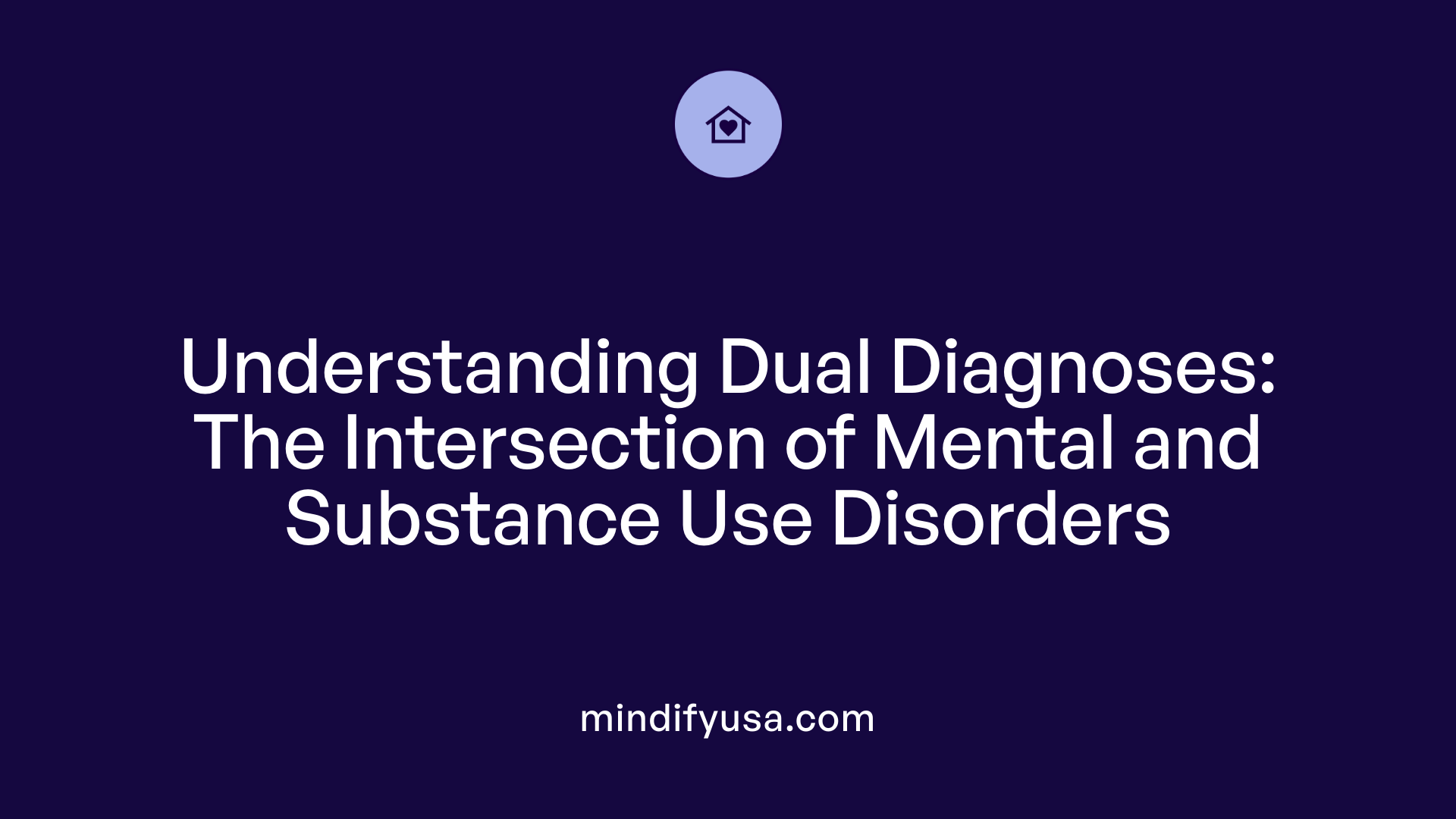
What is a dual diagnosis or co-occurring disorders?
A dual diagnosis, also known as co-occurring disorders, refers to the presence of both a mental health disorder and a substance use disorder (SUD) in the same individual.
These conditions are common and often interconnected. Sharing risk factors such as genetics, stress, childhood trauma, and environmental influences, they tend to coexist more often than not.
Sometimes, mental health issues lead individuals to self-medicate with substances like alcohol or drugs, which can aggravate existing conditions. Conversely, substance use can change brain chemistry, leading to the development or worsening of psychiatric symptoms.
Treating both the mental health disorder and substance use disorder at the same time is usually more effective than addressing them separately. Integrated treatment approaches, which consider the complex interactions between these conditions, are essential for better outcomes.
Overall, dual diagnosis requires comprehensive, person-centered care that can effectively manage the intricate relationship between mental health and substance use issues.
Approaches and Strategies for Treating Co-occurring Disorders
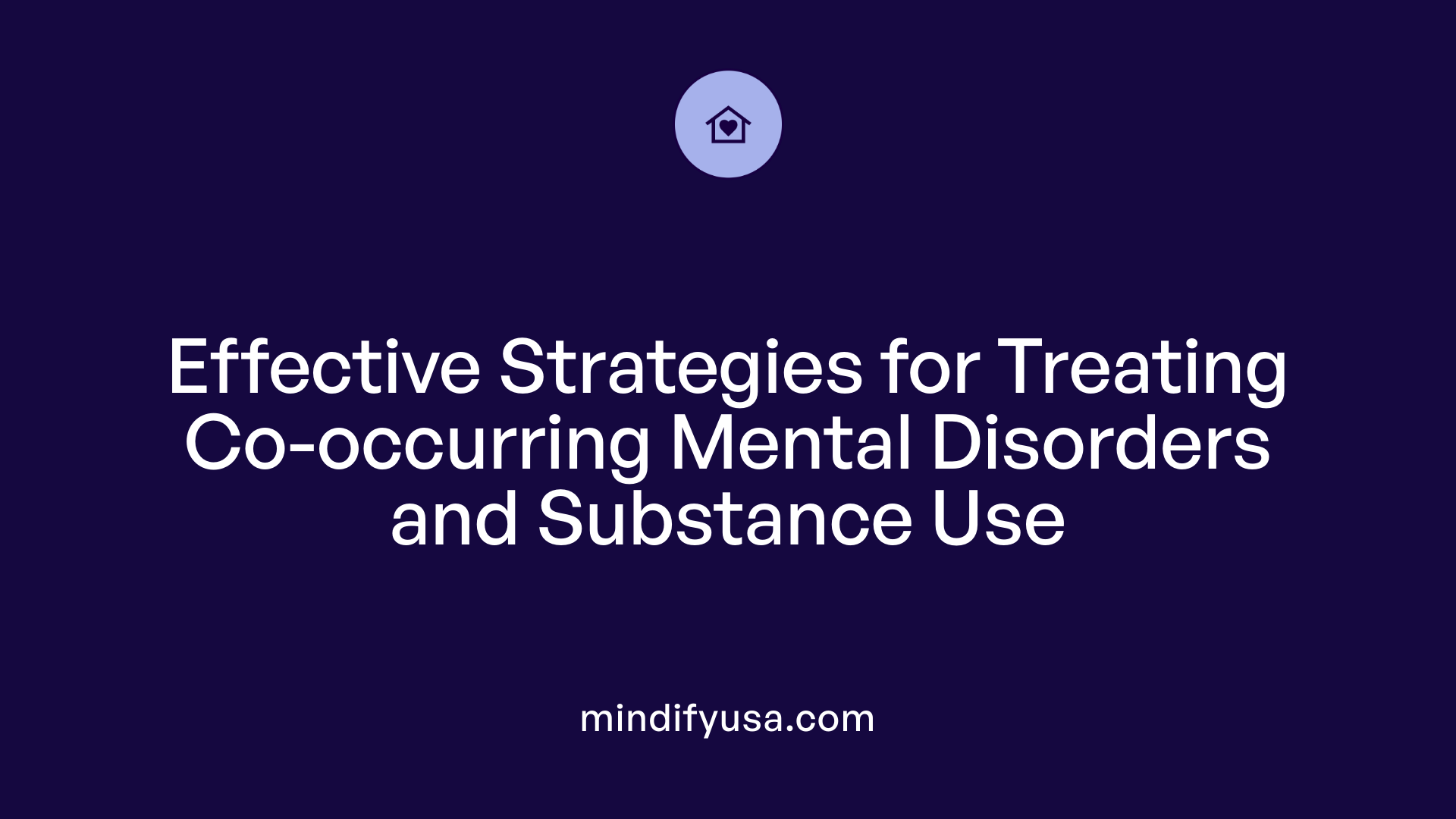
What are some strategies for treating individuals with co-occurring mental health conditions?
Treating individuals with both a mental health disorder and substance use disorder, often called dual diagnosis, requires a comprehensive and coordinated approach. These co-occurring conditions are common, and effective treatment focuses on addressing both issues at the same time.
One of the main strategies used is integrated treatment models. This approach involves teams of healthcare providers working together to create personalized plans that treat mental health conditions and substance use disorders simultaneously. This can include outpatient services, inpatient programs, or a combination of both, depending on the severity of each condition.
Behavioral therapies are critical components of treatment. Cognitive-behavioral therapy (CBT) helps clients recognize and change negative thought patterns and behaviors. Dialectical behavior therapy (DBT), on the other hand, enhances emotional regulation and interpersonal skills, which are especially useful for clients with personality disorders or severe emotional disturbances.
Medication management also plays a vital role. Prescribing medications can help alleviate symptoms of both mental health illnesses and manage withdrawal or dependence related to substance use. Support groups, such as peer-led recovery groups, provide emotional support and practical advice, helping sustain long-term recovery.
In some cases, detoxification or inpatient stabilization programs are necessary at the outset to safely manage withdrawal symptoms and reduce immediate risks. Ensuring continuous follow-up care, including regular assessments and adjustments to treatment, is vital for success.
Building a strong therapeutic relationship is essential. Professionals trained in dual diagnosis understand the complexities of co-occurring conditions and tailor interventions accordingly. Including family members and community support enhances recovery by providing a network of ongoing support.
Early intervention can significantly improve outcomes. When treatment begins promptly after diagnosis, clients are more likely to see improvements and sustain recovery.
Personalized care—adjusted to the individual’s unique needs, preferences, and specific conditions—is critical. This may involve combining medications, therapy types, and support systems to best fit each person's circumstances.
Overall, a holistic and multidisciplinary approach that tackles mental health and substance use issues together offers the greatest chance for successful management and long-term recovery.
Supporting Recovery: Building Therapeutic Alliances and Family Involvement
Why is establishing a strong therapeutic rapport important?
Creating a trusting and empathetic relationship with clients is essential in managing co-occurring mental health conditions. When clients feel understood and respected, they are more likely to engage actively in treatment, share their thoughts honestly, and follow recommended plans. Building rapport involves showing genuine concern, demonstrating active listening, and being culturally sensitive.
How can person-centered and culturally responsive care benefit individuals with complex mental health needs?
Treatments tailored to a person’s unique experiences, cultural background, and personal values lead to better engagement and outcomes. Culturally responsive care involves understanding clients’ cultural beliefs, language preferences, and social contexts. This approach helps reduce feelings of alienation, respects their identity, and fosters a collaborative treatment environment.
What is the role of family and community support?
Family and community involvement can significantly improve recovery prospects for individuals with multiple diagnoses. Support networks provide emotional stability, assist with treatment adherence, and help in managing daily challenges. Educating loved ones about mental health conditions enables them to offer meaningful support while reducing stigma.
How can I support someone with multiple mental health problems?
Supporting someone with multiple mental health problems requires a compassionate and non-judgemental approach. Listen carefully, let them lead the conversation, and respond sensitively, avoiding assumptions or diagnoses. Offer emotional support by encouraging open communication, discussing self-care strategies, and helping them access professional help when needed.
Be alert to potential crises; if there is immediate danger, seek urgent help by calling 999 or visiting A&E. Additionally, provide reassurance, signpost appropriate support services like Samaritans, Mind, or Rethink, and respect their autonomy while offering ongoing understanding and encouragement.
Challenges in Diagnosis and Treatment of Complex Mental Disorders
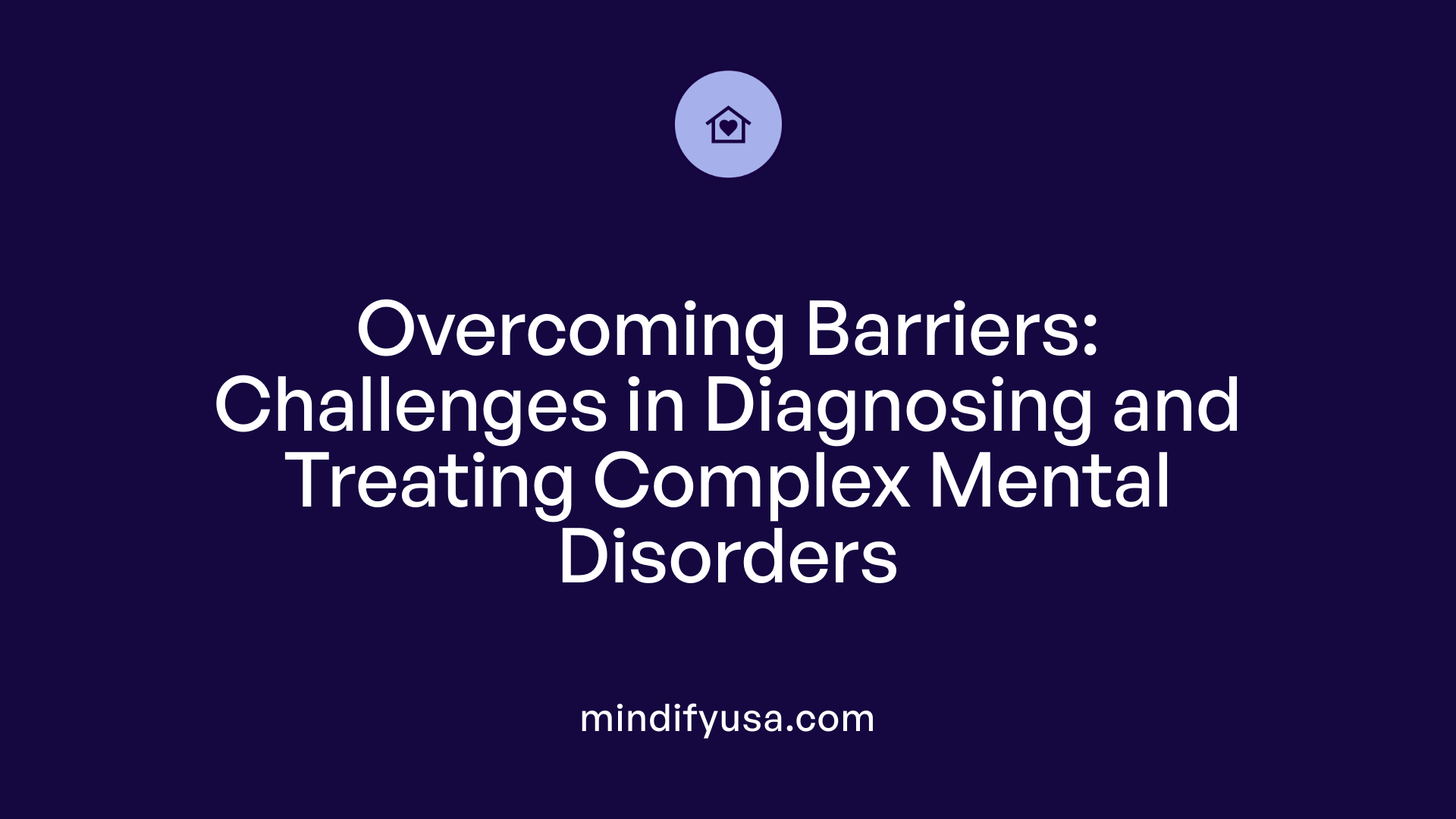
What are the challenges and barriers to seeking mental health care?
Accessing mental health care presents numerous challenges rooted in societal, systemic, and individual factors. One of the primary obstacles is social stigma, which can discourage individuals from openly discussing their symptoms or seeking help out of fear of judgment and discrimination. This stigma is often reinforced by cultural beliefs and misconceptions about mental illnesses.
Structural barriers also significantly impede care. Many regions face shortages of qualified mental health providers, especially in rural or underserved communities, making it difficult for individuals to find appropriate services. Insurance issues add another layer of difficulty, with high out-of-pocket costs, limited coverage, or denial of claims reducing the likelihood of consistent treatment.
Cultural and socioeconomic barriers further complicate access. Racial disparities and language differences can hinder effective communication and trust between patients and providers. Socioeconomic status impacts the ability to afford treatment, while fears of social exclusion and lack of community support can prevent individuals from actively seeking help.
These combined hurdles contribute to delays in diagnosis, inadequate treatment, and worsened health outcomes.
Diagnostic difficulties and overlap of symptoms
Diagnosing mental health conditions is often a complex process due to overlapping symptoms among various disorders. Conditions like depression, bipolar disorder, anxiety disorders, and personality disorders can share common features such as mood disturbances, irritability, or difficulty concentrating.
This symptom overlap may lead to misdiagnosis or missed diagnoses, especially when comprehensive evaluations are not conducted. For example, undiagnosed borderline personality disorder can be mistaken for bipolar disorder, and physical health issues like hypothyroidism can mimic depression.
Clinicians rely on detailed patient history, physical examinations, and sometimes lab tests, but symptoms’ subjective nature and potential withholding of information by patients make accurate assessment challenging.
Risks of misdiagnosis and overtreatment
Incorrect diagnosis can lead to inappropriate or excessive treatment. Misdiagnosis may result in prescribing medications that are unnecessary or potentially harmful, leading to polypharmacy, which increases the risk of side effects and drug interactions.
Overtreatment may also stem from attempting to address broad or multiple symptoms without a precise understanding of the root causes. This can cause patient frustration, reduced trust, and even exacerbate symptoms.
Furthermore, overtreatment with medications, especially when unwarranted, can mask underlying issues and delay effective therapy, complicating recovery.
Clinical biases and the importance of differential diagnosis
Clinicians must employ careful differential diagnosis to distinguish between similar presenting conditions. Biases, such as assuming a primary mood disorder without considering trauma history or physical illnesses, can impair diagnostic accuracy.
Recognizing that some disorders such as PTSD or complex trauma may present symptoms overlapping with mood or personality disorders is vital. Employing an empathetic, patient-centered approach, alongside culturally responsive strategies, helps mitigate biases.
Accurate diagnosis often requires integrating biological, psychological, social, and spiritual factors, sometimes involving specialists or second opinions to ensure comprehensive evaluation.
Systemic barriers and access issues
Systemic barriers like fragmented healthcare systems and lack of coordinated care hinder effective treatment. These issues lead to longer wait times, duplicated assessments, and discontinuity of care.
Limited availability of integrated treatment models, which address comorbid conditions such as mental health and substance use, results in suboptimal outcomes. Patients often face difficulties transitioning between services or find programs that meet all their needs.
Overcoming these obstacles requires policy-level changes, increased funding for mental health services, and adoption of integrated care models like co-located or fully collaborative systems.
| Aspect | Challenge | Benefit of Addressing |
|---|---|---|
| Diagnostic | Symptom overlap complicates identification | Accurate diagnosis improves treatment precision |
| Systemic | Fragmented care delays intervention | Coordinated system enhances recovery |
| Access | Provider shortages and costs limit treatment | Improved access supports long-term management |
| Bias | Cultural and clinical biases impair assessment | Fair, unbiased evaluations improve outcomes |
Resources and Support Systems for Managing Multiple Diagnoses
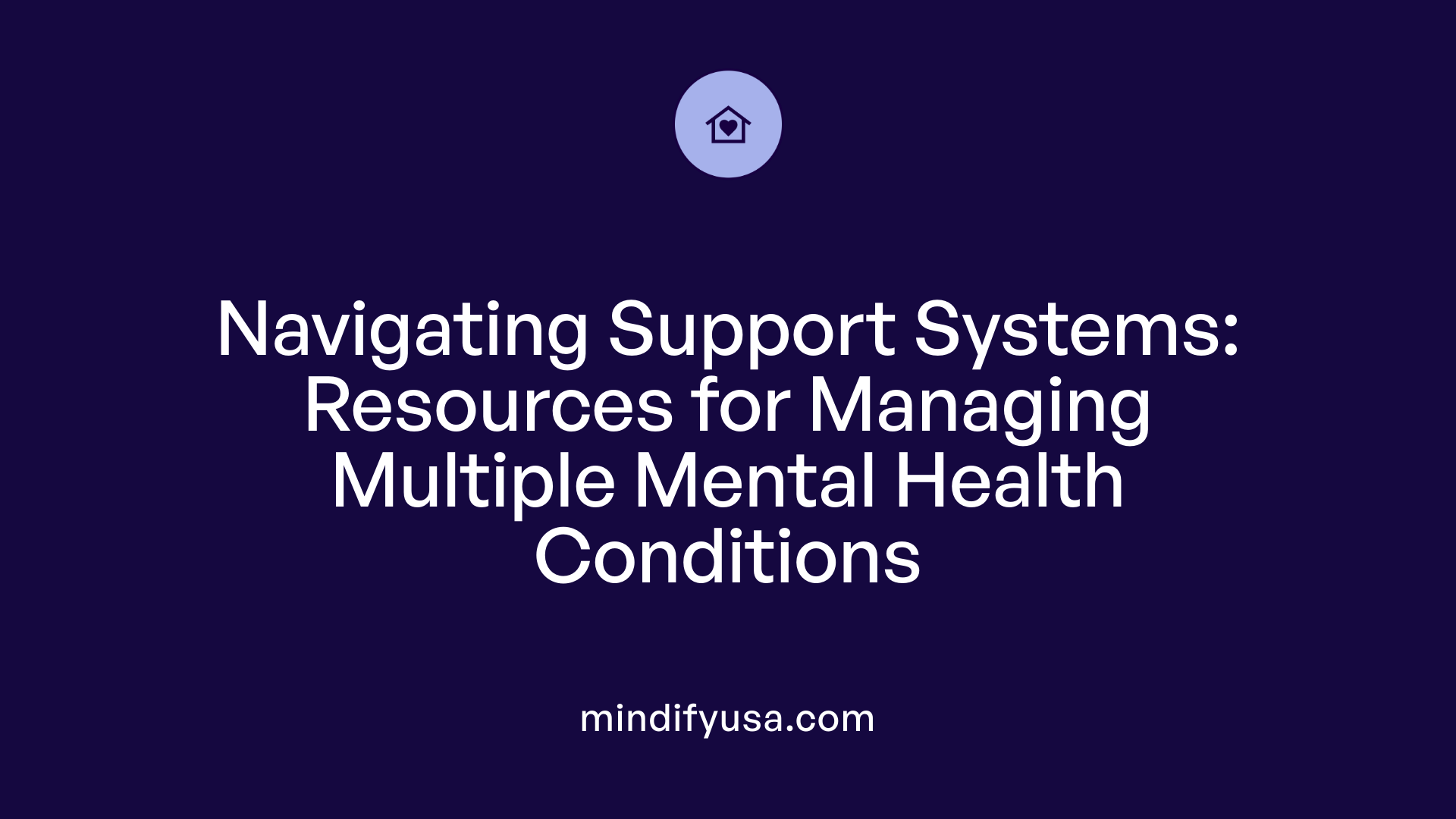 When dealing with complex mental health issues, it's important to recognize that various resources are available to support effective management and recovery.
When dealing with complex mental health issues, it's important to recognize that various resources are available to support effective management and recovery.
Specialized clinics and mental health professionals are often the first step. These providers are trained to diagnose and treat co-occurring disorders, ensuring that multiple conditions are addressed simultaneously for better outcomes.
Support groups and community organizations play a vital role in recovery. Organizations like the National Alliance on Mental Illness (NAMI) offer peer-led groups and educational programs, creating a sense of community and shared understanding.
Governmental agencies and online platforms also provide valuable resources. The Substance Abuse and Mental Health Services Administration (SAMHSA) offers tools such as the 'Find Support' directory, helplines including the 988 Crisis Lifeline, and evidence-based guidelines for integrated treatment approaches.
Overall, the combination of professional care, community support, and accessible online resources helps individuals manage their conditions effectively. Building a strong relationship with healthcare providers, participating in support networks, and utilizing available information can significantly improve recovery prospects for those with multiple mental health diagnoses.
The Crucial Role of Accurate Diagnosis in Effective Treatment and Long-term Outcomes
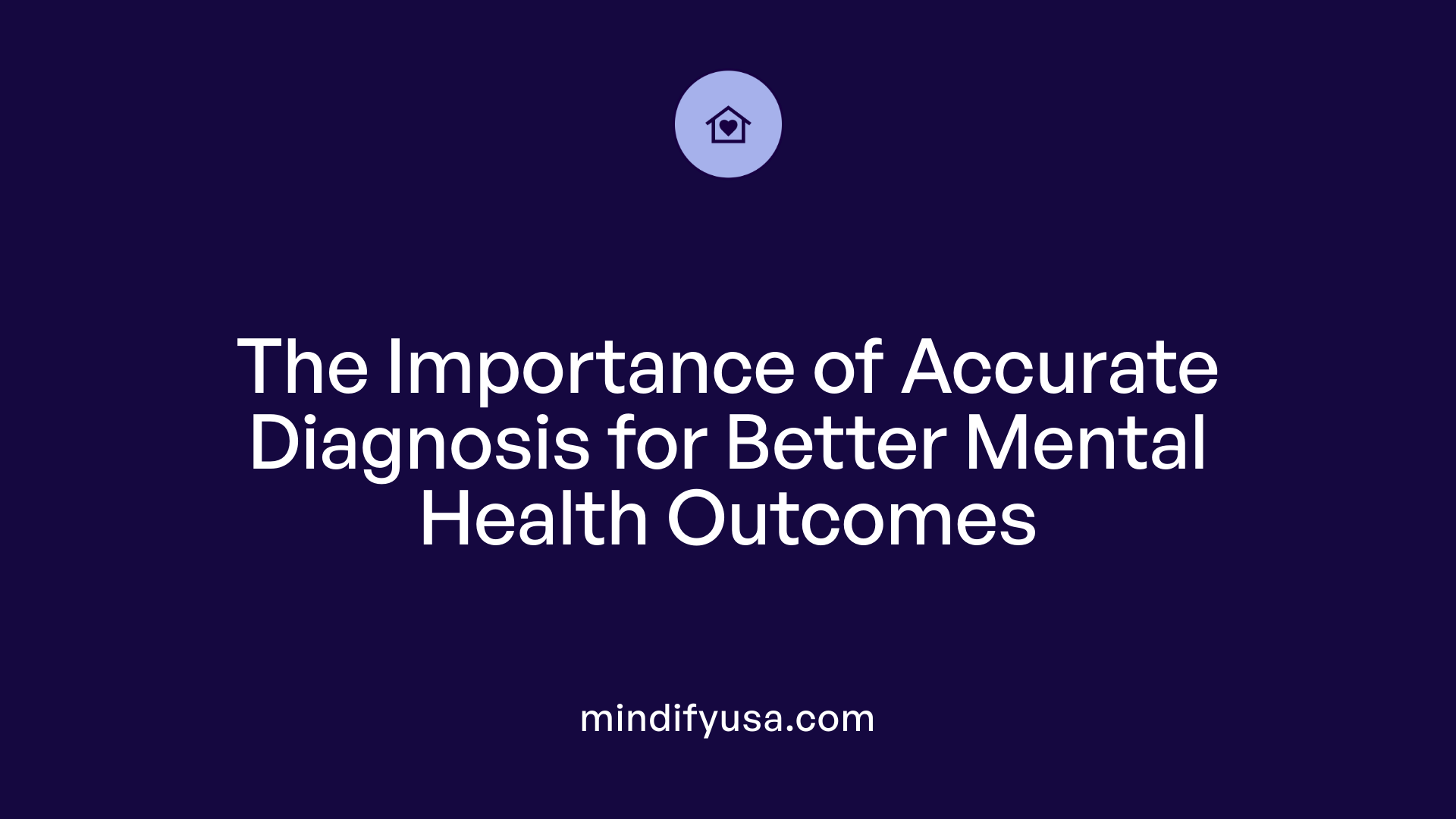
Why is accurate diagnosis important in mental health treatment?
An accurate diagnosis is vital in the realm of mental health because it sets the foundation for effective treatment. When clinicians correctly identify a person’s mental health condition, they can create personalized, evidence-based treatment plans that are more likely to succeed.
Proper diagnosis not only validates the individual’s experience but also helps reduce confusion and self-blame. It improves communication among healthcare providers, patients, and support networks, which is essential for coordinated care.
Moreover, an accurate diagnosis minimizes the risks of misdiagnosis, such as giving the wrong medications or treatments that may not help or could worsen the condition. It prevents unnecessary interventions and conserves resources.
Furthermore, understanding the precise nature of a person’s mental health issues enhances the likelihood of long-term management success. It guides appropriate interventions, improves quality of life, and supports sustainable recovery.
Methods of diagnosis including assessments and biological tools
Diagnosing mental health conditions typically involves thorough assessments, including clinical interviews, psychological tests, and detailed patient histories. Clinicians look for symptom patterns and how they impact daily functioning.
In addition to psychological evaluations, biological tools like brain SPECT imaging can help identify abnormal activity or structural differences linked to certain mental disorders. Genetic studies also uncover shared genetic architecture among disorders, offering insights into underlying biological factors.
Laboratory tests, such as blood work, can rule out physical conditions that mimic psychiatric symptoms, like hypothyroidism or infections, ensuring a comprehensive approach.
The risks of misdiagnosis and symptom overlap
Misdiagnosis is a significant risk in mental health care, especially because many disorders share overlapping symptoms. For example, symptoms of borderline personality disorder can resemble bipolar disorder, and depression can be mistaken for hypothyroidism.
Such overlaps can lead to incorrect treatments that are ineffective or harmful, and may delay appropriate care. Overlapping symptoms complicate differential diagnosis, requiring careful evaluation and sometimes multiple consultations.
Incorrect diagnosis also affects prognosis and can contribute to frustration, increased distress, or worsening of mental health conditions.
The importance of comprehensive evaluation
A comprehensive evaluation considers biological, psychological, social, and spiritual factors influencing a person’s mental health. This includes physical health assessments, trauma histories, and social environments.
Using multiple assessment techniques, clinicians can better understand the complexity of each case. This thorough approach helps distinguish between disorders with similar symptoms, ensuring that no underlying issues are overlooked.
Accurate diagnosis through detailed evaluation leads to targeted, integrated treatment plans, increasing the chances of successful recovery and long-term stability.
| Aspect | Description | Importance |
|---|---|---|
| Assessment techniques | Interviews, psychological tests, patient history | Establish symptom patterns and impact |
| Biological tools | Brain imaging, genetic studies, lab tests | Identify biological underpinnings and rule out physical causes |
| Risks of overlap | Symptom similarities across disorders | Risks misdiagnosis and inappropriate treatment |
| Comprehensive evaluation | Holistic review of biological, psychological, and social factors | Ensures complete understanding for tailored care |
A precise diagnosis guides effective treatment, reduces risks, and supports lasting recovery, emphasizing the importance of comprehensive evaluation and advanced diagnostic methods in mental health care.
Moving Forward with Confidence and Compassion
Handling multiple mental health diagnoses requires a combination of thorough assessment, integrated treatment strategies, compassionate support, and an understanding of systemic challenges. Advancements in diagnostic tools, personalized care plans, and resource availability are making it increasingly possible to foster positive outcomes for individuals with complex co-occurring conditions. Continued education, advocacy, and collaboration among healthcare providers and support networks are vital in overcoming barriers and ensuring that everyone receives the comprehensive care they deserve. By prioritizing accurate diagnosis, tailored interventions, and empathetic support, we can help individuals navigate their mental health journeys toward stability and well-being.
References
- How to Deal With Multiple Mental Illnesses - Talkspace
- Chapter 5—Strategies for Working With People Who Have Co ...
- Managing Life with Co-Occurring Disorders - SAMHSA
- The Importance of a Complete Diagnosis: Managing Multiple Mental ...
- Complex Mental Health Conditions - Amen Clinics
- Multiple diagnoses are the norm with mental illness; new genetic ...
- Dual Diagnosis (Co-Occurring Disorders) - Cleveland Clinic
- Managing Life with Serious Mental Illness - SAMHSA






































































































